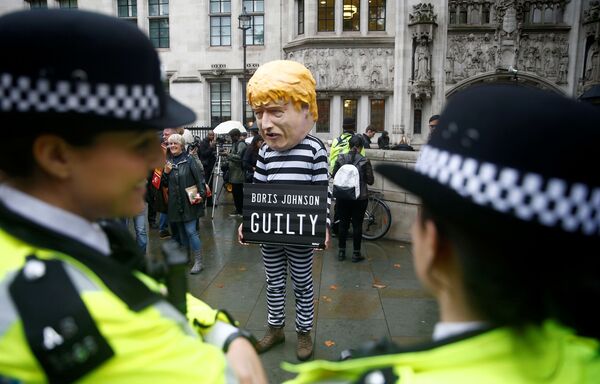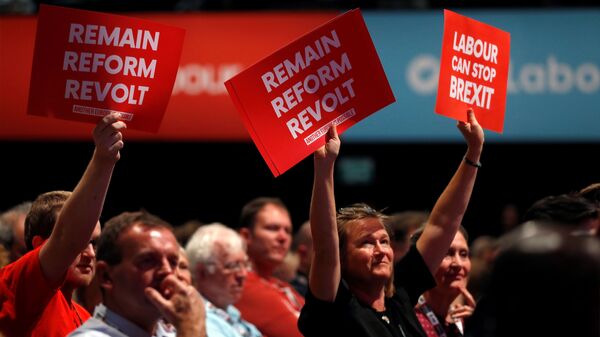Britain is at war. Thankfully it’s a war in which no one is getting killed, at least not yet. The way tempers are rising though, you wouldn't bet against it.
Trevelyan says of the Great Civil War that it ‘divided every rank in the land’. It’s the same with the civil war over Brexit. Families have been split asunder. They include those of both the Prime Minister Boris Johnson, whose brother Jo resigned from the government, and whose sister Rachel has accused the PM of turning the House of Commons despatch box into a ‘bully pulpit’, AND the leader of the Opposition, Jeremy Corbyn, whose party’s support for a 2nd referendum, with an option to Remain, has been lambasted by his staunchly pro-Brexit brother Piers.

Friendships have been destroyed, both on social media and face-to-face. Long-standing political parties have fragmented. New parties and groupings have been formed. Remainer Chuka Umunna has been in more parties in 2019 than Kate Moss.
Trevelyan tells us that ‘in every shire the landlords were the leaders on both sides when the war began’. So it was with Brexit. In the one corner in 2016 were Cameron and Osborne, in the other Johnson and Farage.
It’s also fascinating to see that the country is divided along much the same lines as it was in 1640s.
Interestingly, and quite revealingly, more or less the same areas and groups who supported the Cavaliers, support Brexit today, while the same areas and groups who supported Roundheads are now fighting for Remain.
Trevelyan tells us ‘the great strength of the Royal (Cavalier) party lay in the more rustic squires of ancient lineage, who had least connection with the mercantile community, while Parliament usually received the allegiance of squires most closely associated with the world of business’.
Lord Cavendish of Furness would fit in the former category, Sir Richard Branson the latter.
Trevelyan goes on ‘They (the Cavaliers) were strong in the Northern counties and Lancashire’. Well, the same is true of Brexit today. The North West voted 53% for Leave in 2016, in the North East support was even higher, at 58%.
By contrast ‘The South and East were firmly secured for Parliament, owing to the strength of London’s arm in the Home Counties’. Again, three hundred and seventy years on, it’s London that’s strongest for Remain. Seven of the ten areas with the highest vote share for Remain in 2016 were in the British capital.
Trevelyan notes that ‘Roman Catholics were all for the King’, and while religion isn’t as big a factor in politics nowadays, it’s still interesting to note that Jacob Rees-Mogg, on the leaders of today’s ‘Brexit Army’ and his sister the Brexit Party MEP Annunziata, come from a distinguished Roman Catholic family, as indeed does Alexander Waugh (son of Bron, grand-son of Evelyn), a candidate for the Brexit Party.
There are of course inevitably some differences between the 1640s struggle and the Civil War of today. For instance, Oxford was the King’s headquarters back then, today’s the university city is Remain Central.
You’d no more want to go wandering round the city centre in a pro-Brexit T-shirt today, than you would wear a Roundhead helmet there in the 1640s. Cambridge though was a Roundhead stronghold then (Oliver Cromwell was the MP for Cambridge), and is strong pro-Remain territory today. In fact, the central Market Ward in Cambridge had the highest percentage of Remain voters (87.8%) in the country in 2016.
Given the parallels, do the earlier Civil Wars of the 17th century give us a clue as to might prevail this time- and why? Trevelyan says ‘In the end the King lost for lack of money…The parts of England that owed his authority were on the average less wealthy than those which divided him’.
Isn’t that exactly the same with Brexit today? Generally speaking, it’s the poorer parts of Britain, the communities which have lost out most to neoliberal globalisation, which are the most pro-Brexit. No socio-economic-age group supported Brexit more strongly than over 55s in Classes C2 and DE. By contrast, no class group supported Remain more than AB and C1 (71%).
Does anyone seriously think (whatever camp they’re in), that Brexit would not have been delivered by now if it was the other way round?
Trevelyan believes the support of the City of London- and the richest parts of the country- for the Roundheads proved decisive. Could the backing for Remain of the big global investment banks and billionaire capitalists like Mr George Soros, be equally decisive today?
Consider the way the wealth of leading Remain campaigners has enabled them to mount a succession of very expensive legal challenges to Brexit. They may have lost the 2016 referendum, but they haven’t (as yet) lost the war.
Back in the 1640s appearances were deceptive. Oliver Cromwell was portrayed as the underdog, striking a blow for the people against an autocratic monarch who believed in the ‘Divine Right’ of Kings. In fact he was a wealthy man ‘born into one of the greatest and wealthiest families of Huntingdonshire’, whose pro-Parliamentary, business-friendly cause had the backing of finance capital. Unlike Citizen Smith of the Tooting Popular Front, Oliver didn’t want ‘power to the people!’, but power to the bourgeoisie.
If anyone was the underdog in the conflict, ironically it was the King.
You could say the same thing about the Brexit side today- and that might explain why over three years on we still haven’t left the European Union.
Follow Neil Clark @NeilClark66 and @MightyMagyar.
The views and opinions expressed in the article do not necessarily reflect those of Sputnik.




